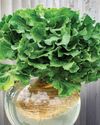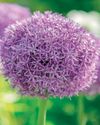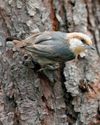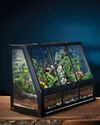
A gravel pathway with stepping stones is an easy, water-saving solution.
1 WATERLESS FREQUENTLY
Choose drought-tolerant plants, trees and shrubs that require less water to thrive. It makes sense to reduce the number of times you need to lug a full watering can or hose around the yard, plus watering restrictions are a reality in many areas. Plenty of beautiful native options work in a variety of climates and soils with little water.
The keys are to carefully match the plant to its new growing conditions and to water it consistently until it's established. Once it has a good root system, it will grow with minimal supplemental water.
2 LET GO OF LAWN CARE
Many folks love their grass lawns but, frankly, an attractive lawn can require lots of upkeep. Replace a patch of grass with an appropriate ground cover plant to slash your chore time without sacrificing a lush, lovely yard.
This story is from the June/July 2022 edition of Birds & Blooms.
Start your 7-day Magzter GOLD free trial to access thousands of curated premium stories, and 9,000+ magazines and newspapers.
Already a subscriber ? Sign In
This story is from the June/July 2022 edition of Birds & Blooms.
Start your 7-day Magzter GOLD free trial to access thousands of curated premium stories, and 9,000+ magazines and newspapers.
Already a subscriber? Sign In

Basics of Hydroponics
Use these top tips and plant picks to have a successful soil-free garden

Rooted in Resilience
These hardy perennials will thrive in most zones

Social and Supportive
Brown-headed nuthatches take a helpful approach to raising their young

All About Owl Pellets
And why you should give a hoot about them

Ask the Experts
Advice from our pros about houseplants, bird feeding and more

BRING THE OUTDOORS IN
Making a terrarium is about as close as you can get to a Zen DIY project. Once you have gathered the proper materials and squared away your plant selections, it's as simple as layering it all together and watching your mini ecosystem thrive. Here, I'll walk you through my foolproof process and cover all the required elements for good filtration, healthy soil, strong root growth and resistance against fungus and disease.

GROW THIS. NOT THAT
Six easy-to-grow houseplants—and six that may not be the right choice for you

Winter MAGIC
Forecasts may be frigid, but grab your binoculars because birding opportunities are still incredible

Sense or Nonsense? - Why some birds can taste and smell - but others can't
Does a porcelain berry taste like a blueberry to a gray catbird? Does a block of lard smell like frying bacon to a northern flicker? The short answer is no. While some avian species do have a well-adapted sense of taste or smell, they can't distinguish between flavors and odors the way humans can. They're not picking up every ingredient in the suet you put out, says José Ramírez-Garofalo, an ornithology researcher at Rutgers University in New Jersey and the director of Freshkills Biological Station in Staten Island, New York.

Maple Mania - Amazing facts about this fall foliage mainstay
Amazing facts about this fall foliage mainstay